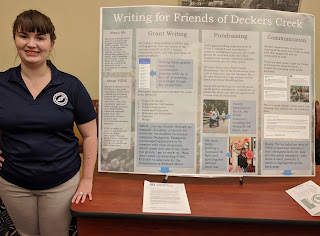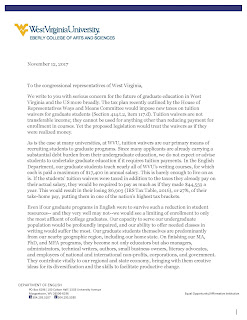by NancyCaronia, Teaching Assistant Professor, Department of English, Mikaela
England, and Amelia Jones
 |
Recognize this photo?
Cast of WVU's English Department 1892 production of Richard III.
Melville Davisson Post, fourth from left. |
In 130 Colson Hall hangs a black
and white photograph of the cast of an 1891 WVU English Department production of
Richard III. Directed by mystery
writer Melville Davisson Post, Shakespeare’s history was mounted to raise money
for WVU’s first football team. While there are no records of how much money was
raised, the West Virginia & Regional History Center (WVRHC) does house the papers and other ephemera of Post, whose
detective fiction was respected by authors from Ellery Queen to William
Faulkner and whose creation Uncle Abner was touted by the scholar Howard
Haycraft as “the greatest American contribution” to detective fiction next to
Edgar Allan Poe’s C. Auguste Dupin.
Born on April
19, 1869 to the wealthy farmer Ira Carper Post and his wife Florence in
Harrison County, West Virginia, the younger Post was raised outside of
Clarksburg in a brick mansion colloquially known as “Templemoor.” He attended a
local high school before joining WVU’s preparatory program in 1886 where he
subsequently enrolled as an English major. After completing his undergraduate
degree, Post went on to WVU’s College of Law and it was during this time that he
and his classmates organized the performance of Richard III. After completing
his law degree in 1892, Post moved to Wheeling, West Virginia. Through the
beginning of the twentieth century, Post served as the assistant prosecuting attorney
of Ohio County.
Although
he spent a considerable amount of time inside the courtroom, Post found time to
write and released his first short story collection in 1896. The Strange Schemes of Randolph Mason focused on an unscrupulous New York attorney
who showed criminals how to skirt the law legally. In the introduction to these
tales, Post rationalized Mason’s amorality as important construct to shake “the
common man” who had “a poor guide to the criminal law…. and no guide at all to
the civil law.” Post also warned his readers, “lawyers are the most arrogant
subset of society.” There is one particularly grim tale where Mason encourages his client to kill a
woman and destroy the evidence by dousing her dismembered body with acid! He
wrote three collections of Mason tales and in the third, Mason became an
avenging crusader, at, perhaps, the behest of his publisher.
 |
| Post with his dog. Date unknown. |
By the
time Post married Ann Bloomfield Gamble Schofield in 1903, he was as well known
for his writings, including work in the Saturday Evening Post and other national magazines, as he
was for his court decisions. When Post left the legal profession in 1906, he
had amassed a fortune, but he and Ann also suffered heartache when their
18-month-old son died. The couple left Wheeling and travelled throughout
Europe. They lived in France for some time, but returned to Clarksburg in a
home that is referred to as “The Chalet.” Ann died in 1919 from pneumonia, and Post remained a widow until his
death in 1930 from injuries sustained from being thrown from a horse.
During
his time in Wheeling as the assistant prosecuting attorney, he had become good
friends with Louis Schrader, a court reporter. After Post left the law,
he and Schrader had a working relationship that lasted 20 years as is
documented by the correspondence in the WVRHC archives. Post wrote all of his
manuscripts in longhand and sent them to Schrader for “auditing,” “punctuation
and typing,” and then, usually, delivery directly to the publisher.
While Post’s
name is not highly recognizable today, his output was prolific with more than
230 titles attributed to his pen. He even could be considered West Virginia’s
first native writer due to his birth a mere 6 years after the secession of West
Virginia from Virginia. After the twisted lawyer Randolph Mason, Post’s most
well known character is the backwoods detective Uncle Abner. Situated in Harrison
County, Uncle Abner travels through an antebellum western Virginia to assist
hard-working mountaineers with any trouble they may have. In “TheDoomdorf Mystery” his nephew views him as “the right hand of the land,” and
he tackles mysteries and unrepentant crime with simple logic and verses from
the Old Testament.
 |
| 1893 West Virginia University football team |
Lawyer
turned writer Melville Davisson Post left his mark not only on the mystery
genre but also on West Virginia history as well. Students at WVU can thank, at
least in part, the generosity of Post and his classmates for our ability to
jingle our keys at kickoff and pack Milan Puskar Stadium six Saturdays every
fall. As an alumna of WVU, his upbringing and subsequent settling in Harrison
County, his legal career in Wheeling, and his character Uncle Abner, Melville
Davisson Post is a true mountaineer through and through.
*A special thank you to the WVRHC,
especially Assistant University Librarian and Digital Projects and Outreach
Archivist Lori A. Hostuttler, who gathered the archives of Melville Davisson Post for
our ENGL 199 course and subsequent visits in order to satisfy our curiosity and
share an important piece of WVU history.
Wheeling, WV native, Amelia Jones is a passionate first-year
English major at WVU who lives by the mantra: be helpful, be kind, and be a
friend.
A native of Hurricane, West
Virginia, Mikaela England is a first-year
English major at WVU who spends her time reading and sleeping.









